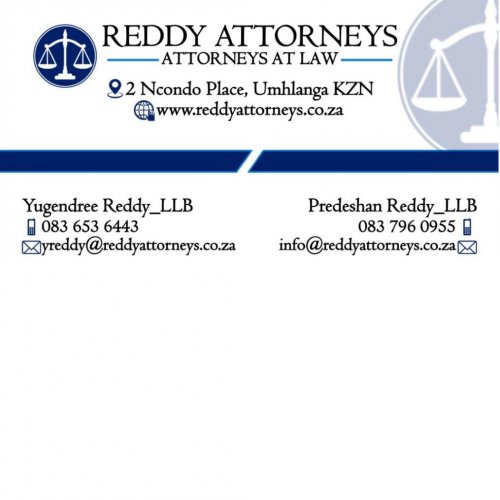Best General Litigation Lawyers in Sandton
Share your needs with us, get contacted by law firms.
Free. Takes 2 min.
List of the best lawyers in Sandton, South Africa
South Africa General Litigation Legal Articles
Browse our 2 legal articles about General Litigation in South Africa written by expert lawyers.
- South Africa Estate Planning and Inheritance for Foreigners
- South Africa practices "Freedom of Testation," allowing you to distribute your assets to anyone you choose, regardless of the "forced heirship" laws in your home country. A separate South African will is the most efficient way to manage local immovable property and prevents administrative delays at the Master of the... Read more →
- Suing for Medical Malpractice in South Africa - Legal Guide
- Medical malpractice claims in South Africa fall under the law of delict, requiring proof of negligence, causation, and actual damages. The standard prescription period for filing a claim is generally three years from the date the patient became aware of the negligence. Expert medical testimony is mandatory to establish whether... Read more →
About Litigation Law in Sandton, South Africa
Litigation in Sandton, South Africa, refers to the process of taking legal action within the jurisdiction, which is part of the Gauteng province. Known as the business hub of Johannesburg, Sandton houses numerous legal firms specializing in various forms of litigation, including commercial, civil, and criminal litigation. The area boasts a sophisticated legal market, with experienced lawyers adept at navigating South Africa’s legal system. Considering the corporate environment in Sandton, litigation here often involves complex legal disputes within corporate, commercial, or professional contexts.
Why You May Need a Lawyer
There are several scenarios where individuals or organizations may require legal assistance in litigation:
- Contract Disputes: Breached contracts in business dealings necessitate legal intervention to resolve disputes.
- Property Issues: Disputes involving property rights or leases may require a legal resolution.
- Commercial Litigation: Companies might face litigation due to breaches, mergers, or acquisition-related disputes.
- Employment Disputes: Issues such as wrongful termination, discrimination, or contract breaches with employers or employees.
- Personal Injury Claims: Injuries resulting from accidents might require legal action to claim damages.
- Intellectual Property: Disputes concerning patents, copyrights, trademarks, or trade secrets.
- Family Law Disputes: Family matters such as divorce or child custody might require litigation to reach a resolution.
Local Laws Overview
The legal landscape in Sandton, South Africa, is governed by both national and local laws that influence litigation. Key aspects include:
- South African Constitution: Serves as the supreme law and affects all legal proceedings.
- The Civil Procedure Act: Governing procedural aspects in civil cases, including practices in court.
- The Companies Act: Regulates corporate-related litigation proceedings.
- The National Credit Act: Influences litigation related to credit agreements and consumer protection.
- Property Law: South Africa's property laws affect real estate-related litigation.
- Labor Relations Act: Essential for understanding employment-related litigation.
- Intellectual Property Laws: Sets out the framework for resolving IP disputes.
Frequently Asked Questions
What is the first step in the litigation process in Sandton?
Typically, the first step is consulting with a lawyer to evaluate your case and determine the appropriate legal strategy.
How long does a litigation case usually take?
The duration varies greatly depending on the complexity of the case, ranging from a few months to several years.
What costs are associated with hiring a litigation lawyer in Sandton?
Costs can vary significantly, but generally include attorney fees, court fees, and other associated legal expenses. It's crucial to discuss fees upfront.
Can I represent myself in court for a litigation case?
While legally possible, self-representation is not advised due to the complexities involved in legal proceedings.
What happens if a settlement isn't reached in my case?
If a settlement isn’t reached, the case may proceed to trial where a judge or jury will decide the outcome.
How can I find a reputable litigation lawyer in Sandton?
Seek recommendations, review online platforms featuring lawyer ratings, and consult the Law Society of South Africa for accredited professionals.
What should I bring to my first meeting with a litigation lawyer?
Bring all relevant documents, such as contracts, correspondence, and financial records pertaining to your case.
What is alternative dispute resolution (ADR)?
ADR includes methods like arbitration or mediation to resolve disputes without going to court and is often faster and more cost-effective.
Are there time limits for filing a lawsuit in Sandton?
Yes, different cases have specific limitation periods depending on the type of legal matter. It's crucial to act swiftly.
How does the appeal process work in litigation?
If dissatisfied with a court's decision, you may have the option to appeal to a higher court, which will review the case based on legal grounds.
Additional Resources
For more information or support regarding litigation in Sandton, consider these resources:
- Law Society of South Africa: Offers resources and guidance for finding qualified legal professionals.
- South African Legal Information Institute (SAFLII): Provides access to legal materials from South Africa.
- Gauteng Provincial Government: Useful for accessing local governmental support and resources.
- Legal Aid South Africa: Provides assistance for those who qualify for legal aid.
Next Steps
If you require legal assistance in litigation, start by pinpointing the specifics of your legal issue, which will guide you in finding a suitable lawyer. Research and reach out to law firms in Sandton, schedule initial consultations, and discuss potential legal strategies, estimated timelines, and costs involved. It's crucial to choose a lawyer specializing in your specific area of need, ensuring they have relevant experience and a proficient understanding of local laws. Securing the services of a competent legal professional is fundamental to navigating the complexities of the litigation process effectively.
Lawzana helps you find the best lawyers and law firms in Sandton through a curated and pre-screened list of qualified legal professionals. Our platform offers rankings and detailed profiles of attorneys and law firms, allowing you to compare based on practice areas, including General Litigation, experience, and client feedback.
Each profile includes a description of the firm's areas of practice, client reviews, team members and partners, year of establishment, spoken languages, office locations, contact information, social media presence, and any published articles or resources. Most firms on our platform speak English and are experienced in both local and international legal matters.
Get a quote from top-rated law firms in Sandton, South Africa — quickly, securely, and without unnecessary hassle.
Disclaimer:
The information provided on this page is for general informational purposes only and does not constitute legal advice. While we strive to ensure the accuracy and relevance of the content, legal information may change over time, and interpretations of the law can vary. You should always consult with a qualified legal professional for advice specific to your situation.
We disclaim all liability for actions taken or not taken based on the content of this page. If you believe any information is incorrect or outdated, please contact us, and we will review and update it where appropriate.















